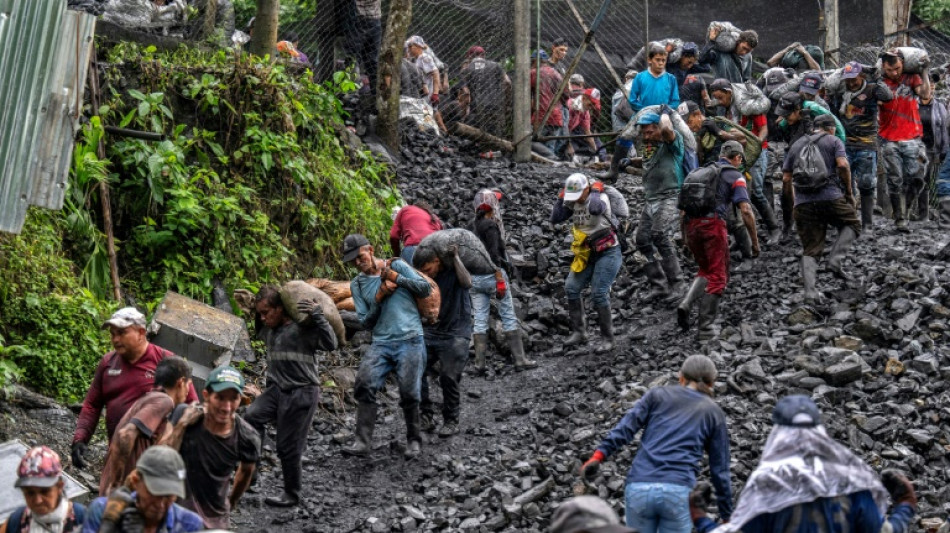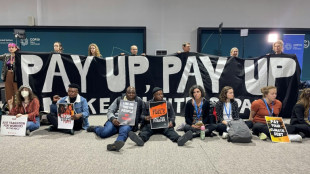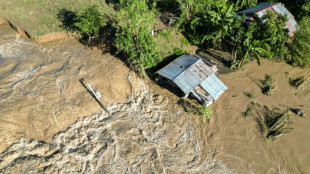
-
 Police break up Georgia vote protest as president mounts court challenge
Police break up Georgia vote protest as president mounts court challenge
-
Spain royals visit flood epicentre after chaotic trip

-
 France's Gisele Pelicot says 'macho' society must change attitude on rape
France's Gisele Pelicot says 'macho' society must change attitude on rape
-
G20 leaders talk climate, wars -- and brace for Trump's return

-
 US lawmaker accuses Azerbaijan in near 'assault' at COP29
US lawmaker accuses Azerbaijan in near 'assault' at COP29
-
Tuchel's England have 'tools' to win World Cup, says Carsley

-
 Federer hails 'historic' Nadal ahead of imminent retirement
Federer hails 'historic' Nadal ahead of imminent retirement
-
Ukraine vows no surrender, Kremlin issues nuke threat on 1,000th day of war

-
 Novo Nordisk's obesity drug Wegovy goes on sale in China
Novo Nordisk's obesity drug Wegovy goes on sale in China
-
Spain royals to visit flood epicentre after chaotic trip: media

-
 French farmers step up protests against EU-Mercosur deal
French farmers step up protests against EU-Mercosur deal
-
Rose says Europe Ryder Cup stars play 'for the badge' not money

-
 Negotiators seek to break COP29 impasse after G20 'marching orders'
Negotiators seek to break COP29 impasse after G20 'marching orders'
-
Burst dike leaves Filipino farmers under water

-
 Markets rally after US bounce as Nvidia comes into focus
Markets rally after US bounce as Nvidia comes into focus
-
Crisis-hit Thyssenkrupp books another hefty annual loss

-
 US envoy in Lebanon for talks on halting Israel-Hezbollah war
US envoy in Lebanon for talks on halting Israel-Hezbollah war
-
India to send 5,000 extra troops to quell Manipur unrest

-
 Sex, drugs and gritty reality on Prague's underworld tours
Sex, drugs and gritty reality on Prague's underworld tours
-
Farmers descend on London to overturn inheritance tax change

-
 Clippers upset Warriors, Lillard saves Bucks
Clippers upset Warriors, Lillard saves Bucks
-
Acquitted 'Hong Kong 47' defendant sees freedom as responsibility

-
 Floods strike thousands of houses in northern Philippines
Floods strike thousands of houses in northern Philippines
-
Illegal farm fires fuel Indian capital's smog misery

-
 SpaceX set for Starship's next flight, Trump expected to attend
SpaceX set for Starship's next flight, Trump expected to attend
-
Texans cruise as Cowboys crisis deepens

-
 Do the Donald! Trump dance takes US sport by storm
Do the Donald! Trump dance takes US sport by storm
-
Home hero Cameron Smith desperate for first win of 2024 at Australian PGA

-
 Team Trump assails Biden decision on missiles for Ukraine
Team Trump assails Biden decision on missiles for Ukraine
-
Hong Kong court jails 45 democracy campaigners on subversion charges

-
 Several children injured in car crash at central China school
Several children injured in car crash at central China school
-
Urban mosquito sparks malaria surge in East Africa

-
 Djibouti experiments with GM mosquito against malaria
Djibouti experiments with GM mosquito against malaria
-
Pulisic at the double as USA cruise past Jamaica

-
 Many children injured after car crashes at central China school: state media
Many children injured after car crashes at central China school: state media
-
Asian markets rally after US bounce as Nvidia comes into focus

-
 Tens of thousands march in New Zealand Maori rights protest
Tens of thousands march in New Zealand Maori rights protest
-
Five takeaways from the G20 summit in Rio

-
 China, Russia ministers discuss Korea tensions at G20: state media
China, Russia ministers discuss Korea tensions at G20: state media
-
Kohli form, opening woes dog India ahead of Australia Test series

-
 Parts of Great Barrier Reef suffer highest coral mortality on record
Parts of Great Barrier Reef suffer highest coral mortality on record
-
Defiant Lebanese harvest olives in the shadow of war

-
 Russian delegations visit Pyongyang as Ukraine war deepens ties
Russian delegations visit Pyongyang as Ukraine war deepens ties
-
S.Africa offers a lesson on how not to shut down a coal plant

-
 Italy beat Swiatek's Poland to reach BJK Cup final
Italy beat Swiatek's Poland to reach BJK Cup final
-
Japan, UK to hold regular economic security talks

-
 Divided G20 fails to agree on climate, Ukraine
Divided G20 fails to agree on climate, Ukraine
-
Can the Trump-Musk 'bromance' last?

-
 US to call for Google to sell Chrome browser: report
US to call for Google to sell Chrome browser: report
-
Macron hails 'good' US decision on Ukraine missiles


Leftover emeralds: the dream of Colombia's poor miners
One man's trash can very well become another man's treasure in the Colombian town of Muzo, the emerald capital of the world.
In this small community in the foothills of the eastern Andes mountains, multinational mining company Esmeralda Mining Services (EMS) deposits tons of earth it has processed from its operations into a cage-like enclosure.
A few times a month, EMS allows hundreds of miners -- known as "guaqueros" or treasure hunters -- to search through the detritus and take home any precious stones they find.
Among the miners is Miguel Hernandez, 72, who grips a cane as he waits outside the cage, where some hopefuls have queued since 3:00 am.
"May our Heavenly Father give me a gift so I can buy a new home... it's what I want most," he told AFP.
Many emerald hunters bring their own shovels and sacks.
After filling the bags with as much earth as they can carry, they haul the bags down to a nearby stream and filter through the findings to see if any emeralds are hidden inside.
Several guaquero associations have been authorized by EMS to help coordinate logistics, organizing miners into different groups to try to defuse the chaos.
"I don't go in there because the people are terrible," said Maria Rodriguez, 58, who accompanied her miner husband. "They grab you, throw you, trample you."
The enclosure remains open for about four hours at a time, and by the end, many return home empty-handed more often than not.
- Green Fever -
Emerald hunters come to Muzo, a town of about 9,000 inhabitants about 125 miles (200 kilometers) north of the capital Bogota, from all over South America.
"The mining causes a very delicate problem," Ximena Castaneda, the mayor of Muzo, told AFP. "And it's that folks come with the expectation they will be millionaires one day."
"Some arrive and make money, while others never do," she continued.
A secondary economy has sprung up around the mining craze, with vendors selling food, drinks and tools just outside the mining area, generating up to $5,000 a day, according to the mining associations.
Those who can eke out a living get by on the luck of the draw.
"I have been in the mines here for 30 years and emeralds have come out... but every day it's getting more difficult," said Gilberto Cifuentes, 54.
- Inequality -
Colombia is one of the world's largest producers of emeralds, with exports of the gems totaling $122 million in 2022, according to the National Federation of Emeralds.
However, most of the profits go toward multinational mining corporations or powerful mining families.
The current structures date back to the 1980s when rival emerald miners unleashed a "green war," which killed thousands in this region in central Colombia.
Victor Carranza -- known as "the emerald czar" -- leveraged support from paramilitary groups and drug traffickers to impose a monopoly and further intensifying the conflict, according to intelligence reports.
The aftermath laid bare stark inequality within the mining industry.
EMS, which did not respond to AFP's request for comment, operates a foundation in Muzo which conducts various social programs.
Still, some believe EMS could do more to give back to the impoverished community around the mines.
Steven Ariza, 35, oversees one of the guaquero associations after the group's previous leader was shot and killed in 2022.
He said the group advocates for EMS to hire more workers from Muzo, source supplies locally and generally invest in the region.
Steven Medina, 24, also seeks to bring awareness to the plight of the miners.
Medina leads foreign buyers on regular tours of the mines to show them the reality behind the precious gems, most of which end up in either Europe or the United States.
"People do need a lot of help" in Muzo, he said.
A.Moore--AT

